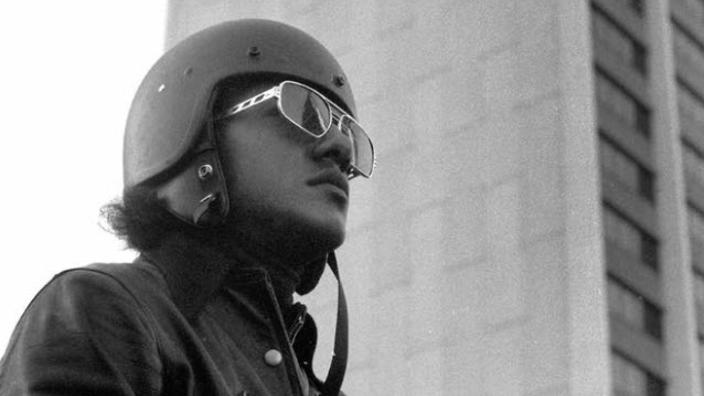 Heroes in The Struggle for Justice Heroes in The Struggle for Justice Important People in the Political Struggle for Aboriginal Rights
| ||||
1946 - 2017 | ||||
Denis Walker, co-founder of Australia's Black Panther Party
·
By Nakari Thorpe
I was here as an observer, to see what's going on here, and its good to see that some people are conscious enough to know what's going on around the place. But what I would like to do,
is to take it further than just being conscious about what's going on around the place and protesting about it. To the point where we do something in terms of solving those things
that are happening, despite what they do."
These are the words of Denis 'Bejam' Walker at the inaugural meeting of the Black G.S.T. (Genocide, Sovereignty, Treaty) public meeting in Melbourne in 2005.
They tell of a man determined to make a difference.
Denis has been described as a trailblazer, revolutionary and a giant in the Aboriginal movement.
He was a Noonuccal man from Minjerribah, Stradbroke Island in southern Queensland, and he fought until the very end.
He passed away on Tuesday, at the age of 71, at the Aboriginal Tent Embassy in Canberra.
It was here at the embassy, on the lawns of Old Parliament House, where he spent much of last years fighting for sovereignty and treaty.
About 100 family, friends and supporters gathered on Sunday around the sacred fire to farewell the long-time activist.
His son, Raymond Walker (Nunka Wulew), read his father's eulogy.
"He will be remembered not only as a father, grandfather and great-grandfather but an advocate, leader and a warrior for our people in his mission
for peace, prosperity and healing. May his spirit rest in the Dreamtime."
His cousin Eddie Ruska travelled from North Stradbroke Island to pay his respects.
"He was like a big brother to all of us young people when we were growing up," he remembers.
Bundjalung man Robert Corowa said his brother elevated the Aboriginal movement.
“I'm very proud of my brother for moving it to the next level and that was to start things like the National Aboriginal Health Organisation, which was started up in Brisbane,
the Aboriginal Legal Services, started in Redfern, which he was a big part of,” he told NITV.
Mr Walker was instrumental in establishing many services available to the Aboriginal and Torres Strait Islander community.
"Like the legal services, health services, housing services, childcare services, pre-school services and influencing government policy in these matters and matters such as education," said fellow activist Les Collins.
Mr Collins, an Indigenous health pioneer, said Denis was ahead of his time.
"My way of thinking is that many of the things we have now may well have taken much longer to have in place if Denis wasn't leading the way back then. That's the sort of visionary he was," Mr Collins said.
The son of poet Oodgeroo Noonuccal (Kath Walker) and Bruce Walker, Denis co-founded the Brisbane chapter of the Australian Black Panther Party in 1972 with fellow Murri activist Sam Watson.
Denis Walker's family at the Aboriginal Tent Embassy
His brother Robert said his time in the Black Panther Party was to ensure those services were set-up for Aboriginal and Torres Strait Islander people.
"All of those things happened through him being in the Black Panthers which was an integral part of his ideology which was serving the people, starting services for Aboriginal and Torres Strait Islander people
so they could be looked after properly," he said.
Denis carried on the legacy of black politics in Brisbane.
"He'd taken over a street in the city and set-up an embassy, one of the first tent embassies in Brisbane in 1969. From there, people starting to understand and stand up for their rights,
he was sick of being pushed around by system and see his people being pushed around by the system," his brother Robert said.
He also carried on the work of his mother, Oodgeroo Noonucal, who was one of Australia's most noted writers and a key figure in national Aboriginal movements of the last century.
She dedicated one of her poems to Denis.
Oodgeroo's words reflect on the suffering and injustice experienced by Aboriginal and Torres Strait Islander peoples. A mother speaking directly to her son about how he might best respond to the challenges he encounters,
both now and in the future.
Denis' sons recounted their grandmother's ode to her son at his service.
Many remembered Denis as a man who never gave up the fight.
Gunai-Gundjitmara elder Marjorie Thorpe first met Denis in Brisbane when she was seventeen during the 1970s.
"To understand the magnitude of such a magnificent leader in this country cannot be underestimated with what his legacy was," she said.
"His establishment of all of these organisations on the basis of sovereignty, of being sovereigns, of us being the original peoples of this country and we never gave up that sovereignty
and we always fought to maintain our spirit of who we are and where we come from."
Budjah Davidson has always looked up to Denis.
And Les Collins said he was a fearless leader.
"He's like our modern day Pemulwuy or Windradyne, he's like a Huey Newton or Martin Luther King all rolled into one.
He was a fighter and a visionary, and as far as I know to my knowledge he never took a day off from fighting for our rights," Mr Collins told 89.9FM Radio.
He said Denis Walker will always be remembered.
"If we all learn of his contribution and as long as he is in our minds, he'll always be here."
A further memorial service will be held on Denis' country at Minjerribah, on North Stradbroke Island in Queensland, on December 28. | ||||
